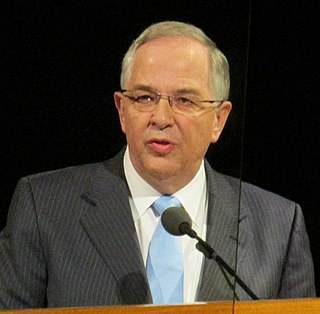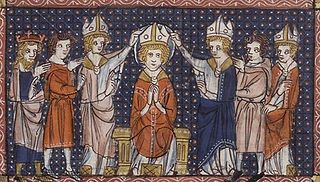A Quote by Daniel A. Poling
God listens to our weeping when the occasion itself is beyond our knowledge, but still within His love and power.
Related Quotes
Loving a holy God is beyond our moral power. The only kind of God we can love by our sinful nature is an unholy god, an idol made by our own hands. Unless we are born of the Spirit of God, unless God sheds His holy love in our hearts, unless He stoops in His grace to change our hearts, we will not love Him... To love a holy God requires grace, grace strong enough to pierce our hardened hearts and awaken our moribund souls.
The fulfilment that is being in love with God is not the product of our knowledge and choice. It is God's gift. Like all being in love, as distinct from particular acts of loving, it is a first principle. So far from resulting from our knowledge and choice, it dismantles and abolishes the horizon within which our knowing and choosing went on, and it sets up a new horizon within which the love of God transvalues our values and the eyes of that love transform our knowing.
When we look at the cross we see the justice, love, wisdom and power of God. It is not easy to decide which is the most luminously revealed, whether the justice of God in judging sin, or the love of God in bearing the judgment in our place, or the wisdom of God in perfectly combining the two, or the power of God in saving those who believe. For the cross is equally an act, and therefore a demonstration, of God’s justice, love, wisdom and power. The cross assures us that this God is the reality within, behind and beyond the universe.
The gift of faith is a priceless spiritual endowment... Our faith is centered in God our Father, and Jesus Christ, our Savior and Redeemer. It is bolstered by our knowledge that the fullness of the gospel has been restored to the earth; that the Book of Mormon is the word of God; and that prophets and apostles today hold the keys of the priesthood. We treasure our faith, work to strengthen our faith, pray for increased faith, and do all within our power to protect and defend our faith.
Love is a way of seeing and a way of being that honors God in everyone we meet. And it changes us in the most fundamental way. All we need to do is welcome the challenge of our relationships, training our eyes to look beyond human behavior to the Presence within. When we seek to live love, we discover through our interactions with others the divinity within ourselves.
Prayer is the converse of the soul with God. Therein we manifest or express to Him our reverence, and love for His divine perfection, our gratitude for all His mercies, our penitence for our sins, our hope in His forgiving love, our submission to His authority, our confidence in His care, our desires for His favour, and for the providential and spiritual blessings needed for ourselves and others.
Immediate knowledge tells us only that God is, not what he is. But if God is not an empty Being beyond the stars, he must be present in the communion of human spirits, and, in his relation to these, he is the One Spirit who pervades reality and thought. Hence there can be no final separation between our immediate consciousness of him and our mediated knowledge of reality.
Because Jesus Christ has prepared Himself from the foundations of the world we can trust Him as one uniquely qualified through the fullness of His love for His Father and us. His love, meekness, condescension, knowledge, power, commitment to agency, and obedience combine to bring this elusive peace to all of God’s children. Our peace was purchased by the shedding of the innocent blood of God’s purest Son. Our trust in His capacity to bring us this peace can be complete because that has been part of His work and His glory from the beginning.
Why pray? Evidently, God likes to be asked. God certainly does not need our wisdom or our knowledge, nor even the information contained in our prayers ("your Father knows what you need before you ask him"). But by inviting us into the partnership of creation, God also invites us into relationship. God is love, said the apostle John. God does not merely have love or feel love. God is love and cannot not love. As such, God yearns for relationship with the creatures made in his image.
It is one step, and a giant one, to see clearly and participate in the love that flows between the persons of the Trinity, but even here, God is seen as the object of his own love. It is yet another step to realize that God is beyond all subject and object and is Himself love without subject or object. This is the step beyond our highest experiences of love and union, a step in which self is not around to divide, separate, objectify or claim anything for itself. Self does not know God; it cannot love him, and from the beginning has never done so.
In this we see the wondrous virtue of the Lord: that the power dwelling in His body should communicate to perishable things the efficacy to heal, and that the divine activity should issue forth even from the hem of His garment. For God is not perceptible by the senses, to be enclosed within a body. The assumption of a body did not limit the nature of His power; but for our redemption His power took upon it the frailty of our body.
Man depends on God for all things: God depends on man for one. Without man's love God does not exist as God, only as creator, and love is the one thing no one, not even God himself, can command. It is a free gift or it is nothing. And it is most itself, most free, when it is offered in spite of suffering, of injustice, and of death . . . The justification of the injustice of the universe is not our blind acceptance of God's inexplicable will, nor our trust in God's love, his dark and incomprehensible love, for us, but our human love, notwithstanding anything, for him.
Let all our employment be to know GOD: the more one knows Him, the more one desires to know Him. And as knowledge is commonly the measure of love, the deeper and more extensive our knowledge shall be, the greater will be our love: and if our love of GOD were great, we should love Him equally in pains and pleasures.

































